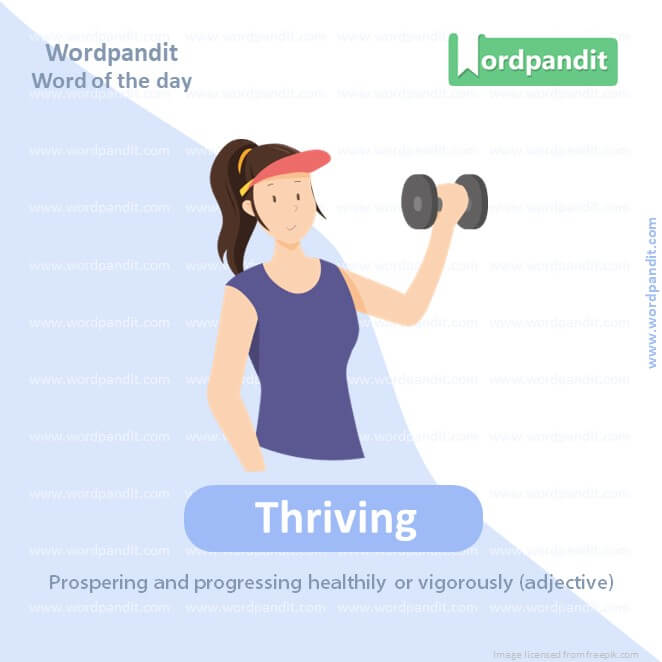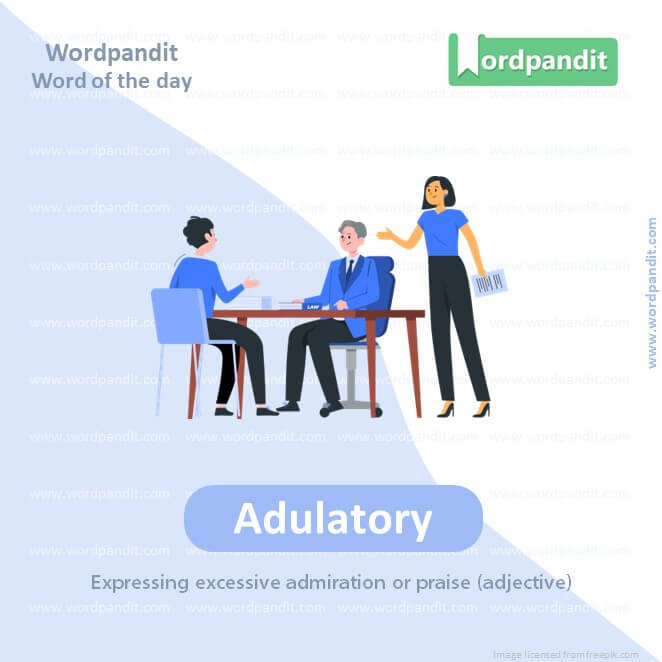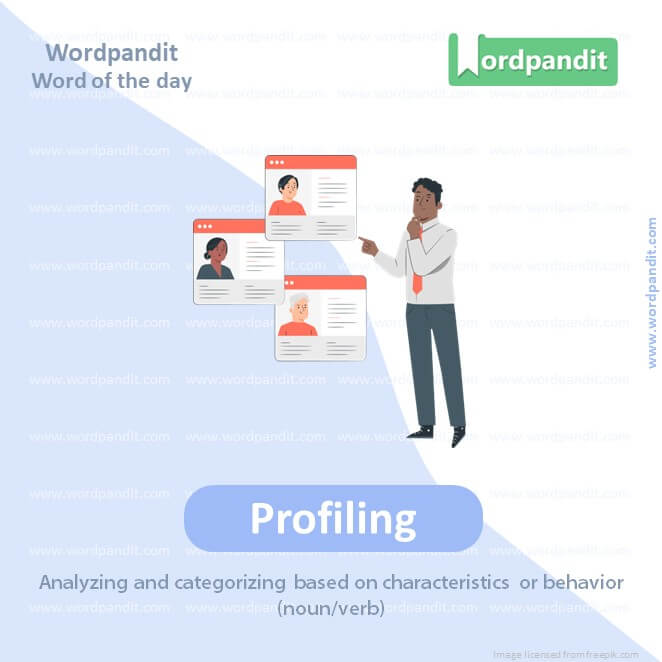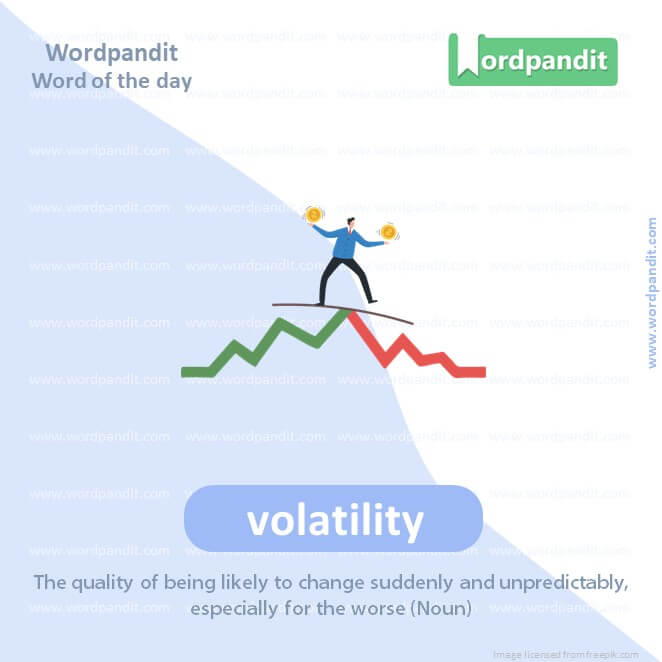Daily Vocabulary Words: List of Daily Used Words in Leading Indian Newspapers
Hi there. Welcome to this special section @ Wordpandit. Our endeavour here is straightforward: highlighting daily vocabulary words that you would come across in leading newspapers in the country. We have included the following newspapers in our selection:
• The Times of India
• The Economic Times
• Hindustan Times
• Mint
• Indian Express
We are putting in extensive work to develop your vocabulary. All you have to do is be regular with this section and check out this post daily. This is your repository of commonly used words; essentially, we are posting a list of daily used words. Hence, this has significant practical application as it teaches you words that are commonly used in leading publications mentioned above.
Visit the website daily to learn words from leading Indian newspapers.

WORD-1: Thriving
CONTEXT: It can only happen when there is a thriving ecosystem of healthy dialogue around the arts.
SOURCE: Hindustan Times
Explanatory Paragraph: Thriving is like when a plant grows really well because it’s getting enough sunlight, water, and nutrients. It means to do really well and be happy and healthy, like when you’re enjoying your favorite activities and feeling good.
Meaning: Prospering and progressing healthily or vigorously (adjective)
Pronunciation: THRY-vuhng
Synonyms: flourishing, prospering, thriving, booming, successful
Usage Examples:
1. The business is thriving due to increased demand for its products.
2. The garden is thriving with colorful flowers and lush greenery.
3. She is thriving in her new job, enjoying the challenges.
4. A supportive environment can help students thrive academically.
WORD-2: Disbanded
CONTEXT: Several publications and media outlets have either trimmed their arts pages or completely disbanded such sections.
SOURCE: Hindustan Times
Explanatory Paragraph: Disbanded is like when a group of friends decides to stop playing a game together because it’s time to go home. It means breaking up or ending something, like when a team no longer plays together.
Meaning: Dissolved or broken up; ended the association of a group (adjective/verb).
Pronunciation: dis-BAND-ed (adjective), dis-BAND-ed (verb)
Synonyms: dissolved, dissolved, dissolved, dissolved, dissolved
Usage Examples:
1. The band disbanded after their final performance.
2. The club disbanded due to lack of interest from members.
3. The team disbanded after winning the championship.
4. Disbanded groups often lead to new opportunities and collaborations.
WORD-3: Subsume
CONTEXT: Film-based writing or reporting has come to subsume all forms of art writing.
SOURCE: Hindustan Times
Explanatory Paragraph: Subsume is like when you put smaller things inside a bigger box. It means including something smaller or less important within something larger or more important, like how your favorite subject might subsume smaller topics within it.
Meaning: To include or absorb something into a larger or more comprehensive whole (verb).
Pronunciation: suhb-SOOM
Synonyms: incorporate, integrate, assimilate, encompass, include
Usage Examples:
1. The new policy aims to subsume various smaller programs under one umbrella.
2. His argument subsumed all relevant evidence into a coherent narrative.
3. The new theory seeks to subsume previous explanations into a unified framework.
4. Education should subsume both academic knowledge and practical skills.

WORD-4: Adulatory
CONTEXT: The writing is mostly adulatory or biographical, devoid of any critical vocabulary.
SOURCE: Hindustan Times
Explanatory Paragraph: Adulatory is like when someone praises you a lot and says nice things about you. It means showing a lot of admiration or praise, like when your teacher compliments your artwork.
Meaning: Expressing excessive admiration or praise (adjective).
Pronunciation: AD-yuh-luh-tawr-ee
Synonyms: flattering, praising, laudatory, complimentary, idolizing
Usage Examples:
1. The author received adulatory reviews for her latest book.
2. His adulatory speech praised the achievements of the team.
3. Adulatory comments from fans boosted her confidence.
4. Beware of adulatory remarks that may not reflect honest opinions.
WORD-5: Devoid
CONTEXT: The writing is mostly adulatory or biographical, devoid of any critical vocabulary.
SOURCE: Hindustan Times
Explanatory Paragraph: Devoid is like when something is missing or not there at all. It means lacking or being empty of something, like when there are no cookies left in the cookie jar.
Meaning: Completely lacking; without (adjective).
Pronunciation: dih-VOID
Synonyms: lacking, empty, bereft, deficient, wanting
Usage Examples:
1. The room was devoid of furniture except for a single chair.
2. Her speech was devoid of emotion, leaving the audience unimpressed.
3. The desert is often devoid of water during the summer months.
4. His expression was devoid of any sign of guilt.
WORD-6: Coterminous
CONTEXT: We also know that popularity and quality of the art presented are not necessarily coterminous.
SOURCE: Hindustan Times
Explanatory Paragraph: Coterminous is like when two things share the same boundary or edge, like two puzzle pieces fitting perfectly together. It means having the same limits or boundaries as something else.
Meaning: Sharing a boundary or limit; coextensive (adjective).
Pronunciation: koh-TUR-muh-nuhs
Synonyms: coextensive, contiguous, adjacent, bordering, neighboring
Usage Examples:
1. The town’s boundaries were coterminous with the county line.
2. Their interests were coterminous, leading to a strong partnership.
3. The two concepts were coterminous in their application.
4. The project’s timeline was coterminous with the budget constraints.

WORD-7: Profiling
CONTEXT: This could help to encourage diversity both through profiling artists and presenting their work.
SOURCE: Hindustan Times
Explanatory Paragraph: Profiling is like when you create a detailed description of someone based on their behavior or characteristics. It means analyzing and categorizing people based on certain traits or patterns.
Meaning: Analyzing and categorizing based on characteristics or behavior (noun/verb).
Pronunciation: PROH-fahy-ling (noun), PROH-fahyl (verb)
Synonyms: categorization, classification, characterization, stereotyping, analyzing
Usage Examples:
1. The police used profiling techniques to identify potential suspects.
2. The marketing team conducted customer profiling to target specific demographics.
3. Racial profiling is a controversial practice in law enforcement.
4. Profiling individuals based on their online activity can raise privacy concerns.

WORD-8: Volatility
CONTEXT: I believe that small caps must make up a slice of the equity asset allocation pie for investors who are willing to wear seat-belts that absorb the wild volatility of this asset category.
SOURCE: Hindustan Times
Explanatory Paragraph: Volatility is like when something changes a lot and quickly, like the weather going from sunny to stormy in a short time. It means being unstable or unpredictable, like how your mood might change suddenly.
Meaning: The quality of being likely to change suddenly and unpredictably, especially for the worse (Noun)
Pronunciation: vol-uh-TIL-i-tee
Synonyms: instability, unpredictability, fluctuation, variability, uncertainty
Usage Examples:
1. The stock market’s volatility made investors cautious.
2. The political situation was marked by volatility and unrest.
3. Volatility in commodity prices affected global markets.
4. Economic volatility can impact businesses of all sizes.
WORD-9: Strapped
CONTEXT: Investors need two seat-belts to keep them strapped into safety.
SOURCE: Hindustan Times
Explanatory Paragraph: Strapped is like when you have very little money left, and you need to be careful about how you spend it. It means being in a difficult situation because of a lack of resources, like when you run out of snacks before lunchtime.
Meaning: Having a shortage of something; being in a difficult situation due to lack of resources (adjective).
Pronunciation: strapt
Synonyms: short of, lacking, tight, deficient, impoverished
Usage Examples:
1. The company was strapped for cash and had to cut expenses.
2. He felt strapped for time with all his assignments due the same day.
3. The family was strapped for space in their small apartment.
4. Being strapped for resources forced them to be creative in problem-solving.

WORD-10: Appetite
CONTEXT: This can vary according to the risk appetite of each investor.
SOURCE: Hindustan Times
Explanatory Paragraph: Appetite is like when you’re hungry and really want to eat something tasty. It’s the desire or hunger for something, like how you eagerly anticipate your favorite meal.
Meaning: A natural desire to satisfy a bodily need, especially for food (noun)
Pronunciation: AP-i-tahyt
Synonyms: hunger, craving, desire, longing, thirst
Usage Examples:
1. Her appetite for adventure led her to explore new places.
2. The aroma of freshly baked bread awakened his appetite.
3. The movie trailer whetted their appetite for the upcoming film.
4. He had a hearty appetite and enjoyed trying different cuisines.
Vocabulary Daily Words
Among the myriad aspects of language learning, the role of ‘vocabulary daily words’ attests to their undeniable importance. These everyday words form the bedrock of communication. Whether used in casual chat or formal discussion, the fluency and understanding of ‘vocabulary daily words’ can significantly uplift the quality of interaction. However, the vital question is, how to effectively learn these ‘vocabulary daily words’?
The crux of learning ‘vocabulary daily words’ lies in a well-rounded approach that encompasses exposure, understanding, memorization, and practice. Rote memorization might seem like a quick solution, but it lacks context and, thereby, retention. Hence, opt for a diverse range of resources like books, newspapers, podcasts, and digital media. These will bring ‘vocabulary daily words’ to life, providing real-life usage examples and making the learning process inherently engaging.
Next, using memory-enhancing techniques can significantly improve retention of ‘vocabulary daily words’. Techniques such as flashcards or the Leitner System align with the principles of spaced repetition, allowing more effective and long-term learning. Incorporating mnemonic devices, associating new words with unique stories or images, can further facilitate this learning process.
The key to fully grasping ‘vocabulary daily words’ lies in practical usage. Make it a habit to use these words in your daily communications. Whether it’s a friendly conversation, a professional email, or a social media post, try integrating these new words. Doing so provides hands-on practice, strengthening your comprehension and application of these words.
In a nutshell, ‘vocabulary daily words’ are a treasure in the language learning landscape. By harnessing diversified resources, utilizing memory techniques, and actively using these words, your grip on the ‘vocabulary daily words’ will strengthen significantly. So, turn the pages, hit play, start a conversation, and let these ‘vocabulary daily words’ shape the story of your linguistic journey.







